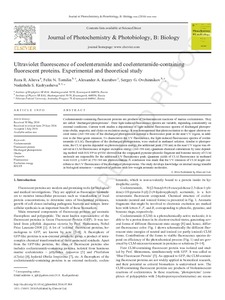Ultraviolet fluorescence of coelenteramide and coelenteramide-containing fluorescent proteins. Experimental and theoretical study.
Скачать файл:
URI (для ссылок/цитирований):
https://elib.sfu-kras.ru/handle/2311/27990Автор:
Alieva, R. R.
Tomilin, F. C.
Kuzubov, A. A.
Ovchinnikov, S. G.
Kudryasheva, N. S.
Коллективный автор:
Научно-исследовательская часть
Дата:
2016Журнал:
Journal of Photochemistry and Photobiology B: BiologyКвартиль журнала в Scopus:
Q2Библиографическое описание:
Alieva, R. R. Ultraviolet fluorescence of coelenteramide and coelenteramide-containing fluorescent proteins. Experimental and theoretical study. [Текст] / R. R. Alieva, F. C. Tomilin, A. A. Kuzubov, S. G. Ovchinnikov, N. S. Kudryasheva // Journal of Photochemistry and Photobiology B: Biology. — 2016. — Т. 162. — С. 318-323Аннотация:
Coelenteramide-containing fluorescent proteins are products of bioluminescent reactions of marine coelenterates. They are called ‘discharged photoproteins’. Their light-induced fluorescence spectra are variable, depending considerably on external conditions. Current work studies a dependence of light-induced fluorescence spectra of discharged photoproteins obelin, aequorin, and clytin on excitation energy. It was demonstrated that photoexcitation to the upper electron-excited states (260-300 nm) of the discharged photoproteins initiates a fluorescence peak in the near UV region, in addition to the blue-green emission. To characterize the UV fluorescence, the light-induced fluorescence spectra of coelenteramide (CLM), fluorophore of the discharged photoproteins, were studied in methanol solution. Similar to photoproteins, the CLM spectra depended on photoexcitation energy; the additional peak (330 nm) in the near UV region was observed in CLM fluorescence at higher excitation energy (260-300 nm). Quantum chemical calculations by time depending method with B3LYP / cc-pVDZ showed that the conjugated pyrazine-phenolic fragment and benzene moiety of CLM molecule are responsible for the additional UV fluorescence peak. Quantum yields of CLM fluorescence in methanol were 0.028 ± 0.005 at 270-340 nm photoexcitation. A conclusion was made that the UV emission of CLM might contribute to the UV fluorescence of the discharged photoproteins. The study develops knowledge on internal energy transfer in biological structures – complexes of proteins with low-weight aromatic molecules.
Коллекции:
Метаданные:
Показать полную информациюСвязанные материалы
Показаны похожие ресурсы по названию, автору или тематике.
-
Ultravioletfluorescence of coelenteramide and coelenteramide-containingfluorescent proteins. Experimental and theoretical study
Alieva, R. R.; Tomilin, F. N.; Kuzubov, A. A.; Ovchinnikov, S. G.; Kudryasheva, N. S. (2016-09)Coelenteramide-containingfluorescent proteins are products of bioluminescent reactions of marine coelenter-ates. They re called‘discharged photoproteins’. Their light-inducedfluorescence spectra are variable, depending ... -
Ultraviolet fluorescence of coelenteramide and coelenteramide-containing fluorescent proteins. Experimental and theoretical study
Alieva, R. R.; Tomilin, F. N.; Kuzubov, A. A.; Ovchinnikov, S. G.; Kudryasheva, N. S. (2016)Coelenteramide-containing fluorescent proteins are products of bioluminescent reactions of marine coelenter- ates. They are called ‘discharged photoproteins’. Their light-induced fluorescence spectra are variable, ... -
Variation of Spectral Characteristics of Coelenteramide-Containing Fluorescent Protein from Obelia Longissima Exposed to Dimethyl Sulfoxide
Petrova, A. S.; Alieva, R. R.; Belogurova, N. V.; Tirranen, L. S.; Kudryasheva, N. S. (2016)Effect of dimethyl sulfoxide (DMSO), a widespread biomedical agent, on spectral-luminescent characteristics of coelenteramide-containing fluorescent protein – discharged obelin – is investigated. Contributions of violet ... -
Variability of fluorescence spectra of coelenteramide-containing proteins as a basis for toxicity monitoring
Alieva, Roza R.; Kudryasheva, Nadezhda S. (2017-08)Nowadays, physicochemical approach to understanding toxic effects remains underdeveloped. A proper development of such mode would be concerned with simplest bioassay systems. Coelenteramide-Containing Fluorescent Proteins ... -
Fluorescent coelenteramide-containing protein as a color bioindicator for low-dose radiation effects
Petrova, Alena S.; Lukonina, Anna A.; Badun, Gennadii A.; Kudryasheva, Nadezhda S. (2017-07)The study addresses the application of fluorescent coelenteramide-containing proteins as color bioindicators for radiotoxicity evaluation. Biological effects of chronic low-dose radiation are under investigation. Tritiated ...

